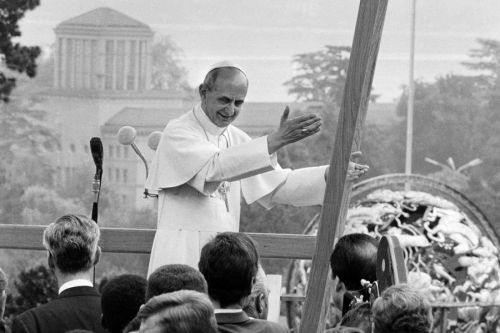With Paul VI due to be beatified at the end of the Synod on the Family, his teaching on the regulation of birth in Humanae vitae has been re-launched by the synod fathers, presenting the teachings in a positive way. Paul VI issued his final encyclical in 1968, after a commission of theologians and experts spent four years meeting to study in-depth whether the Church could be oen to the contraceptive pill other articifical forms of birth control. Though the opinions collected were generally favorable to an opening of Catholic moral teaching to contraception, Paul VI reaffirmed that sexual relations cannot be detached from fecundity. The decision opened a season of disputes against Paul VI’s pontificate, coming from both inside and outside the Church. Paul VI’s position has, however, been defended by Pope Francis. Asked if it was now time for Humanae vitae's teaching to be changed and for the Church to open to birth control, Pope Francis told the Italian newspaper “Il Corriere della Sera” in March “the question is not that of changing doctrine, but of digging deep and making sure that pastoral care takes into account situations and what it is possible for persons to do." This answer has set the tone of discussions at the Synod on the Family. The synod’s pre-discussion relation stressed that “the positive message of Humanae vitae can be re-proposed through a suitable historical hermeneutic, which knows how to grasp historical factors and concerns underlying its writing by Paul VI.” Humanae vitae was not solely an encyclical on the regulation of birth; it more widely dealt with married love and responsible parenthood, reaffirming the Church’s moral teaching on the sanctity of life and the procreative and unitive nature of conjugal relations. But the encyclical was often seen from a negative point of view because of its rejection of any form of artificial contraception. As the synod fathers are searching for new language to represent the teaching of the Church, a new language to propose the teaching of Humanae vitae is needed. The story of Humanae vitae can be also seen as “exemplar” for this synod of bishops. As Pope Francis announced he wanted to dedicate two years and two synods of bishops to the topic of the family, pressure to change the practice — if not the teaching — of the Church has arisen, especially for what concerns such topics as access to Communion for the divorced and remarried, and same-sex couples. A similar pressure for change was witnessed in 1963 when St. John XXIII established the commission for studying the topics of marriage, family, and regulation of birth. When Paul VI succeeded as Bishop of Rome, he enlarged the comission from six to 12 persons, and then in 1965 further increased it to 75 members, plus a president, Cardinal Alfredo Ottaviani, head of the Congregation for the Doctrine of the Faith; and two deputies, Cardinals Julius Doepfner and John Heenan. Though the commission had been established, the question of birth control came up at the Second Vatican Council during discussion of Gaudium et spes. Cardinal Leo Suenens asked on Oct. 29, 1964 if an opening to artificial birth control, and his opinion was backed by many participants of the council. The “progressive wing” acted as a true lobby. The Pontifical Commission ended its works, and Paul VI entrusted a restricted groups of theologians with a further examination of the topic. But in April 1967, a document favorable toward the birth control pill was published simultaneously in the French newspaper “Le Monde,” the English magazine “The Tablet,” and the American magazine “National Catholic Reporter.” The report stressed that 70 members of the Pontifical Commission were favorable to the pill; but the document was in fact “just one of the 12 reports presented to the Holy Father,” Bernardo Colombo, a professor of demographics and a member of the commission, revealed in an article he wrote in Teologia, the journal of the theological faculty of Milan and Northern Italy. So when Paul VI published Humanae vitae, public opinion was already oriented against the Church’s principles which he had reaffirmed, and bitter disputes arose against the Church. Now, it is time to re-propose Montini's teaching the encyclical, and the Synod of Bishops has taken up the issue. As the secular world is pushing for a change in Catholic doctrine, the reality and effectiveness of Humanae vitae, and its story, may in the end be a guiding light for the synod fathers.

